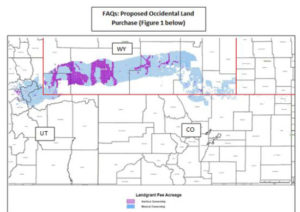The State of Wyoming is considering the purchase of a vast swath of land along the Union Pacific Railroad corridor, including over a million acres of surface and four million acres of mineral rights. The valuable resource is now owned by Occidental Petroleum, since its 2019 merger with Anadarko.
The land, if purchased, would be owned by Wyoming’s State Board of Land Commissioners, a board that exists in all the western states. They manage state trust lands, especially the state school trust lands, set aside at the time of statehood to earn money for public schools. The land boards can and do buy more land to benefit those trusts, but this deal has an unprecedented angle – not all of this land is in Wyoming.
 Occidental’s holdings along that rail corridor cross into three states. Some 600,000 of those acres are in Utah, and 200,000 in Colorado. That has the Attorneys General of both states hitting the books in their law libraries asking the question – can they do that?
Occidental’s holdings along that rail corridor cross into three states. Some 600,000 of those acres are in Utah, and 200,000 in Colorado. That has the Attorneys General of both states hitting the books in their law libraries asking the question – can they do that?
The answer is unclear. As in Colorado, the Wyoming Land Board operates fairly autonomously, because of its unique mission. Under state law, it is given “the power and authority to take such official action as may be necessary in securing title to land grants, or any other lands acquired by the state.” The law does not actually specify, at least not clearly, whether that land has to be in the State itself. Colorado’s law is similarly vague, as are the statutes in most of the other states. The state trust lands granted at the time of statehood are within the state, obviously, and so are all the lands that have been purchased or otherwise acquired since then. But must they be?
It is not just an interesting bit of trivia. It might actually have a significant effect on important policy. What if a large portion of Utah or Colorado actually belonged to Wyoming?
What makes the question unclear, but important, is the involvement of another state. Wyoming is not actually “a foreign state,” as the Utah Attorney General called it during a CNN interview (presumably an unfortunate but innocent mistake). But state ownership nevertheless opens a different can of worms. Many parcels in every state are owned by people and companies located elsewhere, of course. State law governs land uses, whether the owner is a resident or not. But this would suddenly be public land, not private land, and it would be owned by a different public with possibly different priorities.
Consider the absolutely unique missions of state land boards. Unlike all other agencies, they have a single-focused purpose, which is by law to “maximize” the revenue derived from their holdings, to the sole advantage of trust beneficiaries, especially public schools. They lease lands for maximum revenue from grazing, oil and gas, timber, mining, towers, water projects – whatever delivers the most revenue. Though there are some modern-era exceptions, they generally cannot base decisions on issues like wildlife habitat, open space, or other environmental or political concerns.
So, here is the issue. 200,000 acres of the Occidental land is in Larimer and Weld Counties, in northern Colorado. Wyoming’s laws, and its Land Board’s decisions on managing state-trust lands might require leasing this land for oil and gas development, or a feed lot, which might run counter to the wishes of Larimer and Weld Counties. To whom would their citizens turn for relief, when their own Governor, Legislature, and Land Board have no say about those lands?
On the other hand, if it is determined that a State Land Board owning land in another state must manage those lands in accordance with that other state’s laws, that would be entirely new. Such a requirement, of course, does not currently exist in the laws or rules of any state land board. In fact, it would subjugate that board’s autonomy to the political powers of another state – powers to which is it not subject in its own state!
Note that Wyoming has not yet made this decision. Its legislature has authorized an evaluation process, and Governor Mark Gordon is “committed to ensuring that our State gives this potential investment its proper due diligence to determine if this purchase would benefit Wyoming citizens and create new revenues.”
If Wyoming proceeds, a lengthy debate will plow entirely new legal ground. If it is determined to be legal, though, Coloradans might well ask if everyone can play that same game. There are lots of potentially profitable investments out there.
This column originally appeared in the Grand Junction Daily Sentinel March 27, 2020.




Comments on this entry are closed.